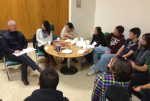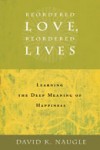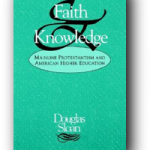Thus far in two prior posts I've suggested that the end-point of a graduate education is to “become a person” in the Biblical sense - that is, to grow into the image of God. This holistic vision will encompass within itself more common educational ideals such as becoming an intelligent, productive citizen and serving the good of humanity. Secondly, I asked readers to integrate their faith with their field of study, and to do so in the context of Christian community. I hope you'll take time to read these two … [Read more...] about Headed to Graduate School: Witness in the Academy
knowledge
Headed to Graduate School: Begin with the End in Mind
In my travels to campuses around the country (40 in the past two years), I meet up with a lot of students who are headed to grad school someday. Here is what I wish I could suggest to each one of them: Begin with the end in mind. The “end” is the final goal, the destination of one's schooling. For many students, that would be to get a good job in their field and make a significant contribution to the overall good of humanity. Not bad! But in my view, for the Christian it's shooting too low. Let me suggest a goal … [Read more...] about Headed to Graduate School: Begin with the End in Mind
Interview: David Naugle on Love, Happiness, and Paideia
David Naugle is professor of philosophy at Dallas Baptist University and the author, most recently, of Reordered Love, Reordered Lives: Learning the Deep Meaning of Happiness. I had a chance to meet David at Jubilee 2010 and ask him a few questions about the nature of happiness, his life as a faculty member, and advice for students considering academic vocations. Originally posted on the ESN website. Mike Hickerson: I don't want to give too much away from the book, but what would be your capsule definition of … [Read more...] about Interview: David Naugle on Love, Happiness, and Paideia
Does Theology Advance Knowledge?
What is the place of theology in the secular academy? I don't have hard data for this, but I think almost no secular colleges and universities still have "theology" departments. Rather, they have "religious studies" departments, of which theology may be a part. Even those universities that have well-respected schools of theology - Harvard, Yale, Duke - keep those schools in a separate line, and offer religious studies courses to undergraduates. We are all aware that religious beliefs have to be carefully articulated and … [Read more...] about Does Theology Advance Knowledge?
Your Mind Matters 4: Acting on Our Knowledge
John Stott wraps up Your Mind Matters with “Acting on Our Knowledge.” He begins by pointing out that we avoid the swing from anti-intellectualism to hyper-intellectualism, by remembering "just one thing: God never intends knowledge to be an end in itself but always to be means to some other end." As a corollary to the mind and biblical knowledge being essential to the six spheres of Christian living, see Your Mind Matters 3: The Mind in Christian Life, Stott highlights the truth that: "the acquisition of … [Read more...] about Your Mind Matters 4: Acting on Our Knowledge




